Project Management Assessment 2: Critical Success Factors, Lessons Learnt, and Recommendations
VerifiedAdded on 2023/06/11
|11
|3342
|257
AI Summary
This assessment evaluates the Salisbury House Project and highlights critical success factors, lessons learnt, and recommendations for project managers. It also discusses the skills required for becoming a successful project manager.
Contribute Materials
Your contribution can guide someone’s learning journey. Share your
documents today.
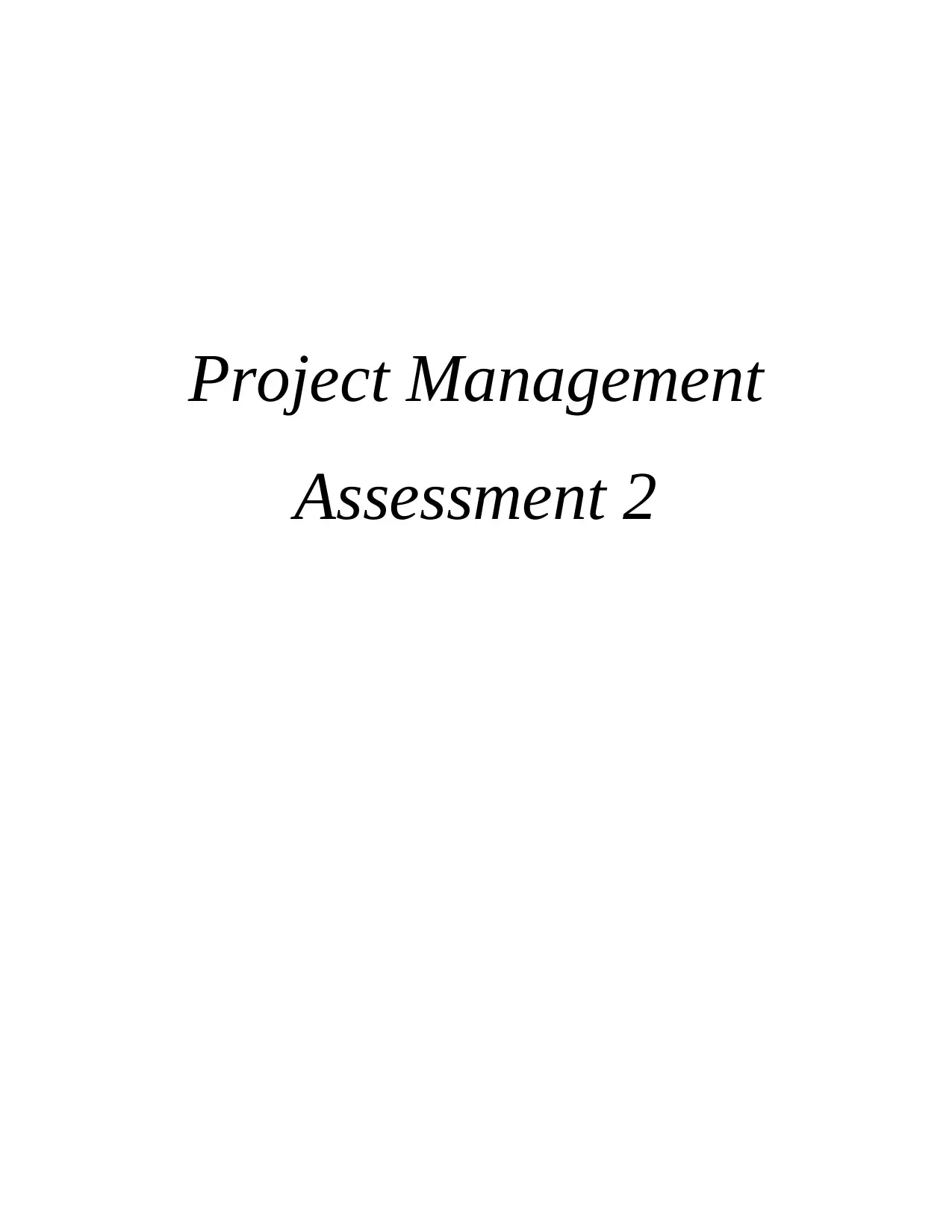
Project Management
Assessment 2
Assessment 2
Secure Best Marks with AI Grader
Need help grading? Try our AI Grader for instant feedback on your assignments.
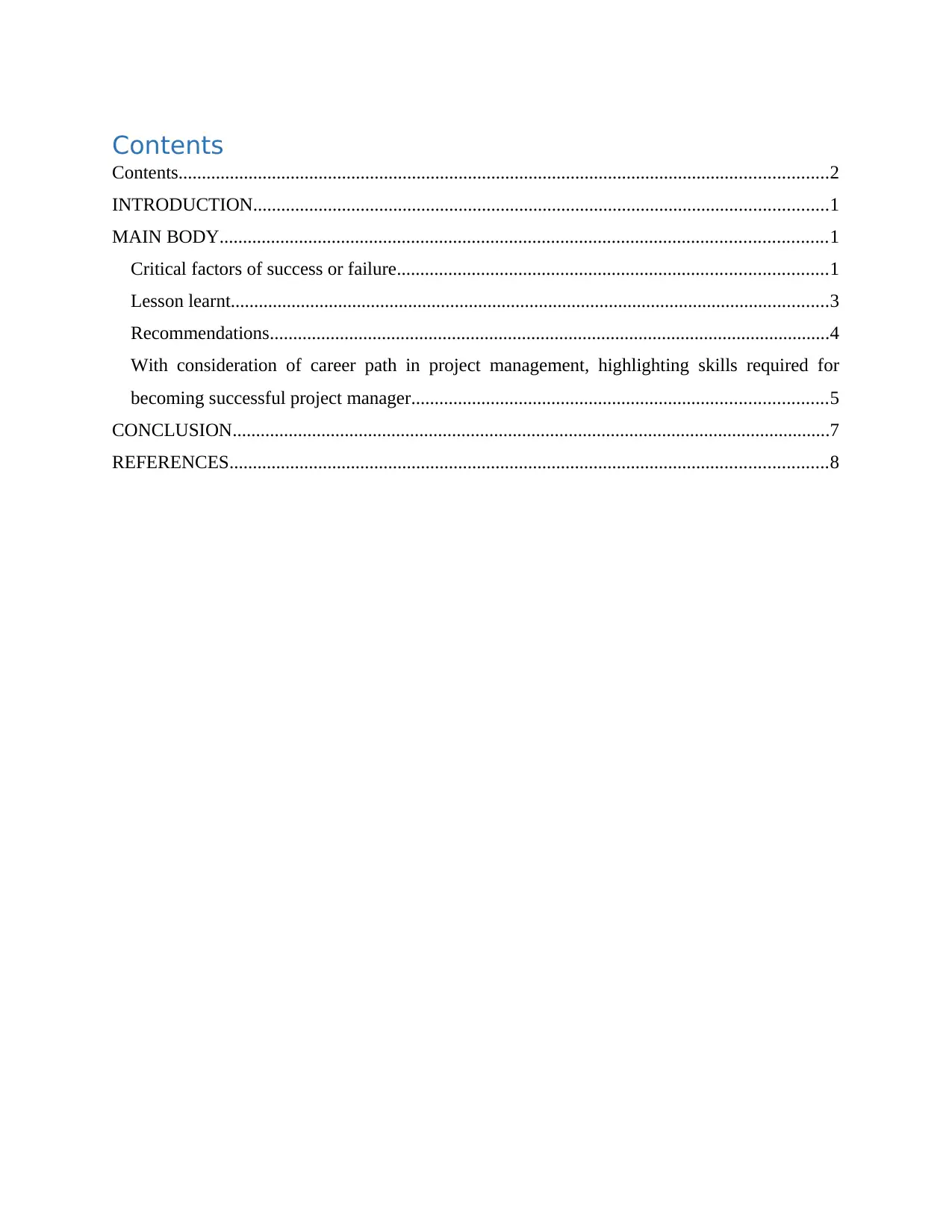
Contents
Contents...........................................................................................................................................2
INTRODUCTION...........................................................................................................................1
MAIN BODY..................................................................................................................................1
Critical factors of success or failure............................................................................................1
Lesson learnt................................................................................................................................3
Recommendations........................................................................................................................4
With consideration of career path in project management, highlighting skills required for
becoming successful project manager.........................................................................................5
CONCLUSION................................................................................................................................7
REFERENCES................................................................................................................................8
Contents...........................................................................................................................................2
INTRODUCTION...........................................................................................................................1
MAIN BODY..................................................................................................................................1
Critical factors of success or failure............................................................................................1
Lesson learnt................................................................................................................................3
Recommendations........................................................................................................................4
With consideration of career path in project management, highlighting skills required for
becoming successful project manager.........................................................................................5
CONCLUSION................................................................................................................................7
REFERENCES................................................................................................................................8

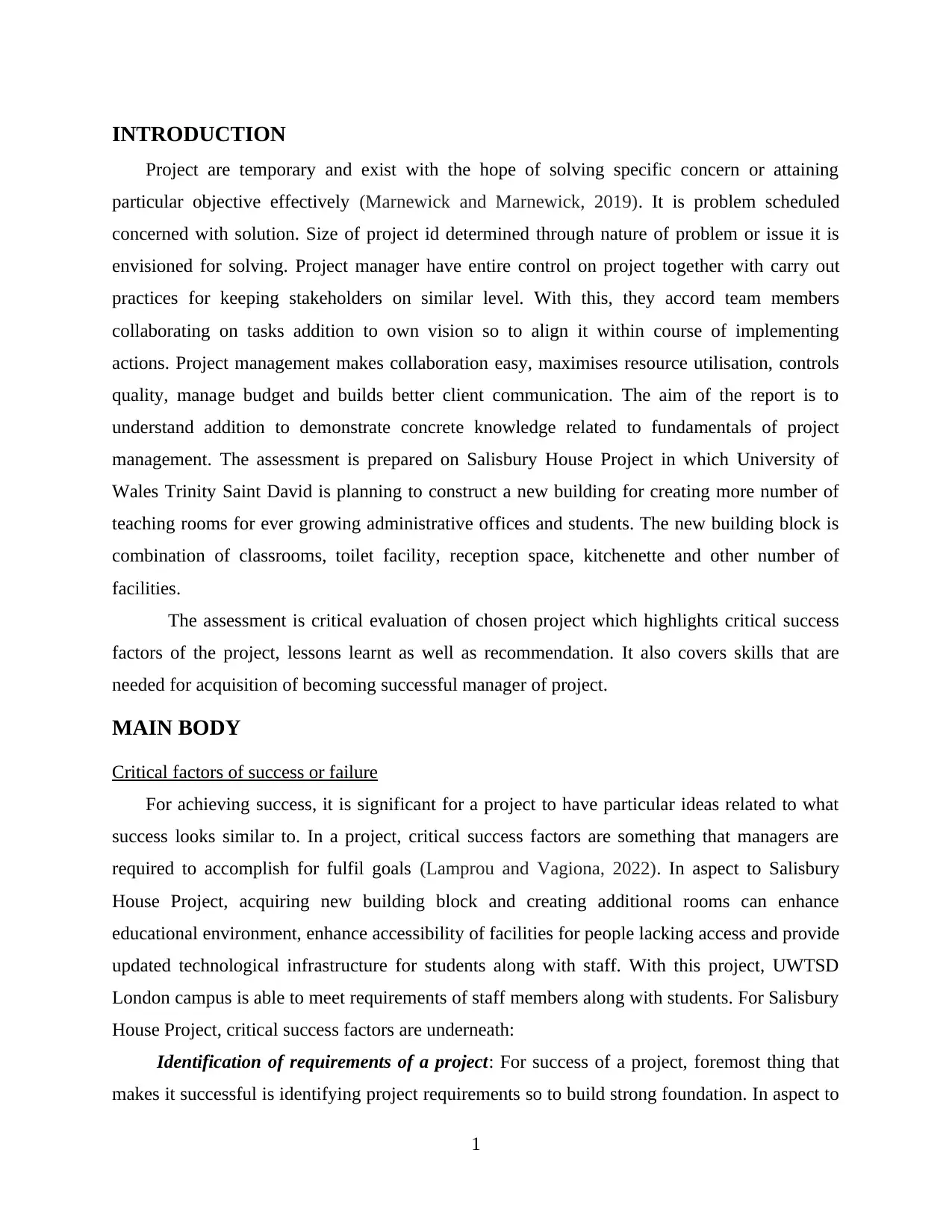
INTRODUCTION
Project are temporary and exist with the hope of solving specific concern or attaining
particular objective effectively (Marnewick and Marnewick, 2019). It is problem scheduled
concerned with solution. Size of project id determined through nature of problem or issue it is
envisioned for solving. Project manager have entire control on project together with carry out
practices for keeping stakeholders on similar level. With this, they accord team members
collaborating on tasks addition to own vision so to align it within course of implementing
actions. Project management makes collaboration easy, maximises resource utilisation, controls
quality, manage budget and builds better client communication. The aim of the report is to
understand addition to demonstrate concrete knowledge related to fundamentals of project
management. The assessment is prepared on Salisbury House Project in which University of
Wales Trinity Saint David is planning to construct a new building for creating more number of
teaching rooms for ever growing administrative offices and students. The new building block is
combination of classrooms, toilet facility, reception space, kitchenette and other number of
facilities.
The assessment is critical evaluation of chosen project which highlights critical success
factors of the project, lessons learnt as well as recommendation. It also covers skills that are
needed for acquisition of becoming successful manager of project.
MAIN BODY
Critical factors of success or failure
For achieving success, it is significant for a project to have particular ideas related to what
success looks similar to. In a project, critical success factors are something that managers are
required to accomplish for fulfil goals (Lamprou and Vagiona, 2022). In aspect to Salisbury
House Project, acquiring new building block and creating additional rooms can enhance
educational environment, enhance accessibility of facilities for people lacking access and provide
updated technological infrastructure for students along with staff. With this project, UWTSD
London campus is able to meet requirements of staff members along with students. For Salisbury
House Project, critical success factors are underneath:
Identification of requirements of a project: For success of a project, foremost thing that
makes it successful is identifying project requirements so to build strong foundation. In aspect to
1
Project are temporary and exist with the hope of solving specific concern or attaining
particular objective effectively (Marnewick and Marnewick, 2019). It is problem scheduled
concerned with solution. Size of project id determined through nature of problem or issue it is
envisioned for solving. Project manager have entire control on project together with carry out
practices for keeping stakeholders on similar level. With this, they accord team members
collaborating on tasks addition to own vision so to align it within course of implementing
actions. Project management makes collaboration easy, maximises resource utilisation, controls
quality, manage budget and builds better client communication. The aim of the report is to
understand addition to demonstrate concrete knowledge related to fundamentals of project
management. The assessment is prepared on Salisbury House Project in which University of
Wales Trinity Saint David is planning to construct a new building for creating more number of
teaching rooms for ever growing administrative offices and students. The new building block is
combination of classrooms, toilet facility, reception space, kitchenette and other number of
facilities.
The assessment is critical evaluation of chosen project which highlights critical success
factors of the project, lessons learnt as well as recommendation. It also covers skills that are
needed for acquisition of becoming successful manager of project.
MAIN BODY
Critical factors of success or failure
For achieving success, it is significant for a project to have particular ideas related to what
success looks similar to. In a project, critical success factors are something that managers are
required to accomplish for fulfil goals (Lamprou and Vagiona, 2022). In aspect to Salisbury
House Project, acquiring new building block and creating additional rooms can enhance
educational environment, enhance accessibility of facilities for people lacking access and provide
updated technological infrastructure for students along with staff. With this project, UWTSD
London campus is able to meet requirements of staff members along with students. For Salisbury
House Project, critical success factors are underneath:
Identification of requirements of a project: For success of a project, foremost thing that
makes it successful is identifying project requirements so to build strong foundation. In aspect to
1
Secure Best Marks with AI Grader
Need help grading? Try our AI Grader for instant feedback on your assignments.
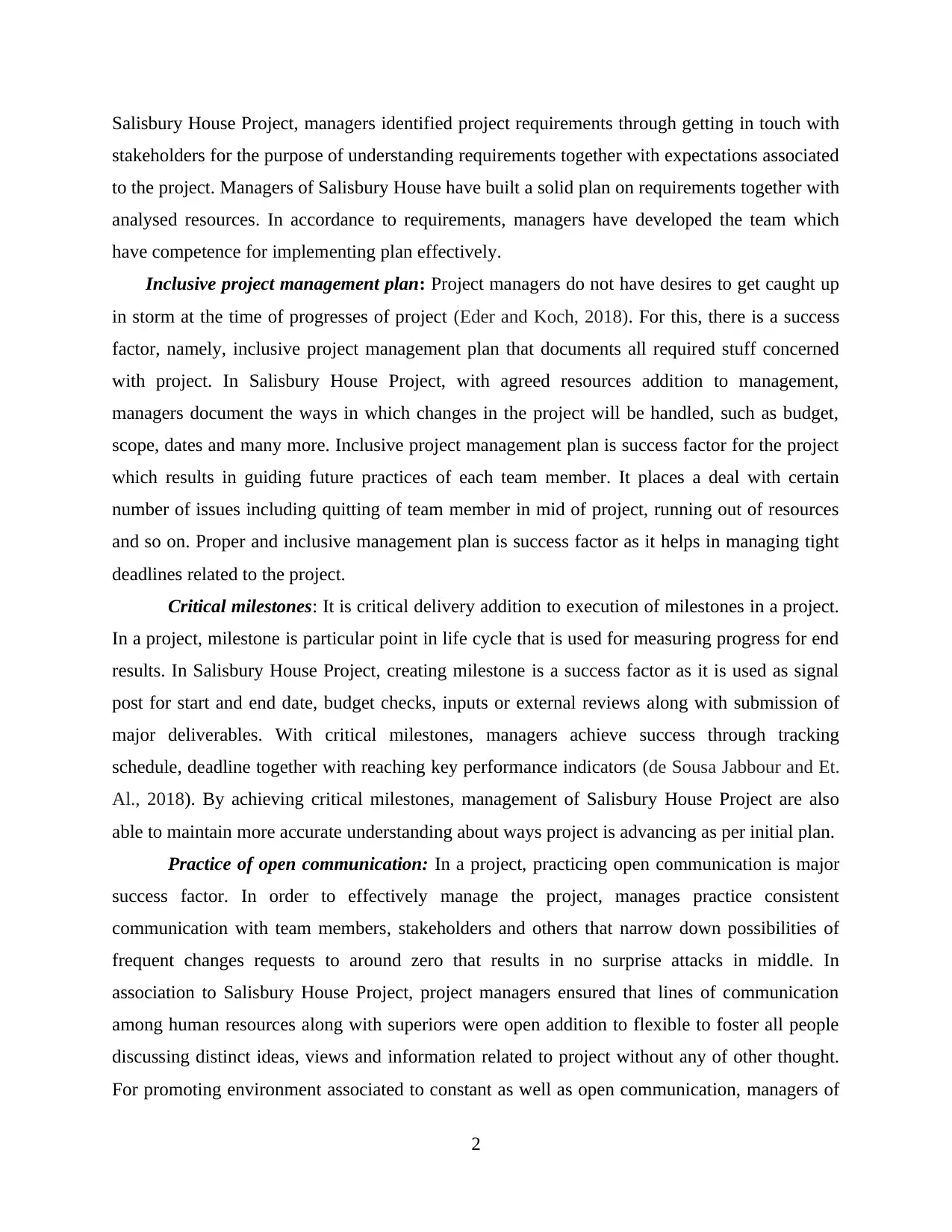
Salisbury House Project, managers identified project requirements through getting in touch with
stakeholders for the purpose of understanding requirements together with expectations associated
to the project. Managers of Salisbury House have built a solid plan on requirements together with
analysed resources. In accordance to requirements, managers have developed the team which
have competence for implementing plan effectively.
Inclusive project management plan: Project managers do not have desires to get caught up
in storm at the time of progresses of project (Eder and Koch, 2018). For this, there is a success
factor, namely, inclusive project management plan that documents all required stuff concerned
with project. In Salisbury House Project, with agreed resources addition to management,
managers document the ways in which changes in the project will be handled, such as budget,
scope, dates and many more. Inclusive project management plan is success factor for the project
which results in guiding future practices of each team member. It places a deal with certain
number of issues including quitting of team member in mid of project, running out of resources
and so on. Proper and inclusive management plan is success factor as it helps in managing tight
deadlines related to the project.
Critical milestones: It is critical delivery addition to execution of milestones in a project.
In a project, milestone is particular point in life cycle that is used for measuring progress for end
results. In Salisbury House Project, creating milestone is a success factor as it is used as signal
post for start and end date, budget checks, inputs or external reviews along with submission of
major deliverables. With critical milestones, managers achieve success through tracking
schedule, deadline together with reaching key performance indicators (de Sousa Jabbour and Et.
Al., 2018). By achieving critical milestones, management of Salisbury House Project are also
able to maintain more accurate understanding about ways project is advancing as per initial plan.
Practice of open communication: In a project, practicing open communication is major
success factor. In order to effectively manage the project, manages practice consistent
communication with team members, stakeholders and others that narrow down possibilities of
frequent changes requests to around zero that results in no surprise attacks in middle. In
association to Salisbury House Project, project managers ensured that lines of communication
among human resources along with superiors were open addition to flexible to foster all people
discussing distinct ideas, views and information related to project without any of other thought.
For promoting environment associated to constant as well as open communication, managers of
2
stakeholders for the purpose of understanding requirements together with expectations associated
to the project. Managers of Salisbury House have built a solid plan on requirements together with
analysed resources. In accordance to requirements, managers have developed the team which
have competence for implementing plan effectively.
Inclusive project management plan: Project managers do not have desires to get caught up
in storm at the time of progresses of project (Eder and Koch, 2018). For this, there is a success
factor, namely, inclusive project management plan that documents all required stuff concerned
with project. In Salisbury House Project, with agreed resources addition to management,
managers document the ways in which changes in the project will be handled, such as budget,
scope, dates and many more. Inclusive project management plan is success factor for the project
which results in guiding future practices of each team member. It places a deal with certain
number of issues including quitting of team member in mid of project, running out of resources
and so on. Proper and inclusive management plan is success factor as it helps in managing tight
deadlines related to the project.
Critical milestones: It is critical delivery addition to execution of milestones in a project.
In a project, milestone is particular point in life cycle that is used for measuring progress for end
results. In Salisbury House Project, creating milestone is a success factor as it is used as signal
post for start and end date, budget checks, inputs or external reviews along with submission of
major deliverables. With critical milestones, managers achieve success through tracking
schedule, deadline together with reaching key performance indicators (de Sousa Jabbour and Et.
Al., 2018). By achieving critical milestones, management of Salisbury House Project are also
able to maintain more accurate understanding about ways project is advancing as per initial plan.
Practice of open communication: In a project, practicing open communication is major
success factor. In order to effectively manage the project, manages practice consistent
communication with team members, stakeholders and others that narrow down possibilities of
frequent changes requests to around zero that results in no surprise attacks in middle. In
association to Salisbury House Project, project managers ensured that lines of communication
among human resources along with superiors were open addition to flexible to foster all people
discussing distinct ideas, views and information related to project without any of other thought.
For promoting environment associated to constant as well as open communication, managers of
2
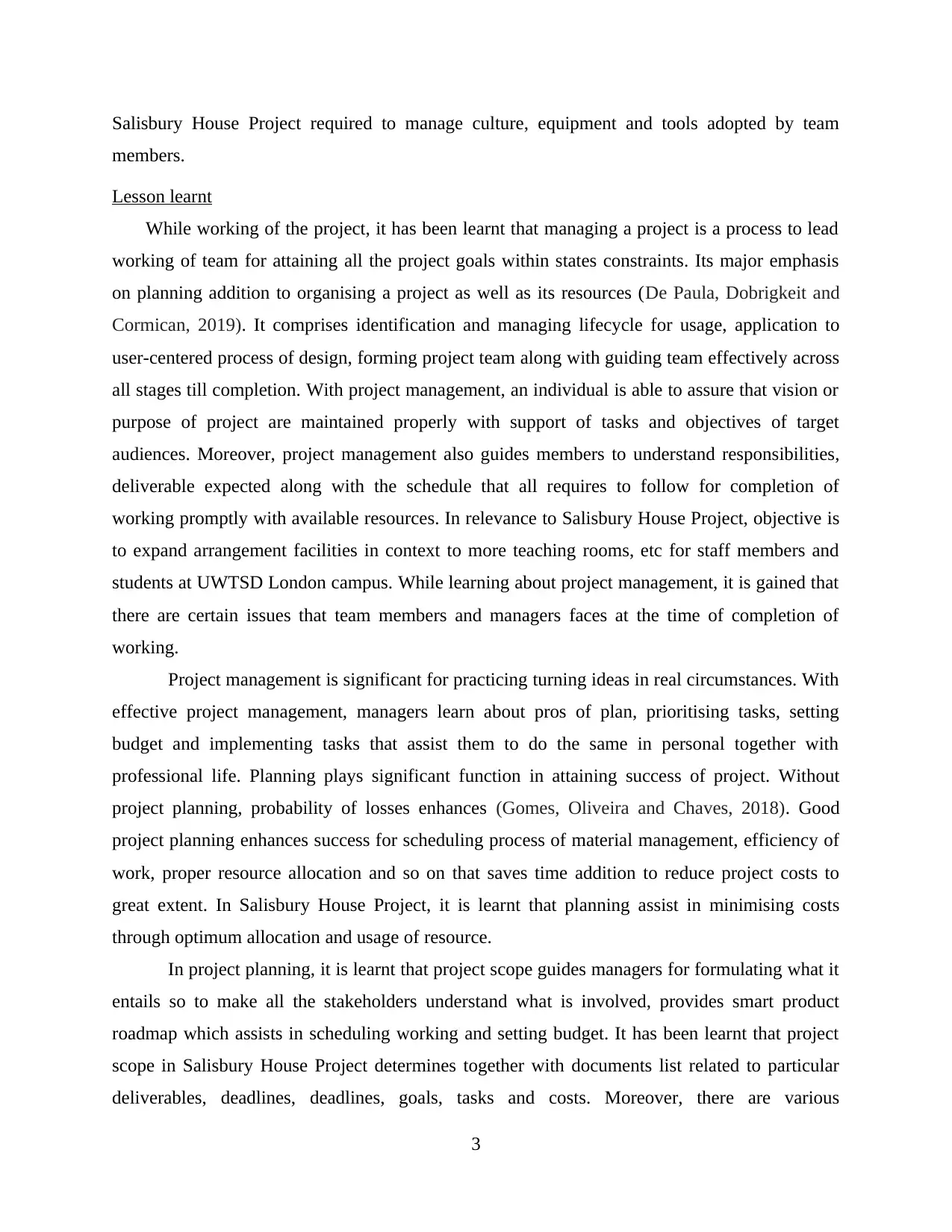
Salisbury House Project required to manage culture, equipment and tools adopted by team
members.
Lesson learnt
While working of the project, it has been learnt that managing a project is a process to lead
working of team for attaining all the project goals within states constraints. Its major emphasis
on planning addition to organising a project as well as its resources (De Paula, Dobrigkeit and
Cormican, 2019). It comprises identification and managing lifecycle for usage, application to
user-centered process of design, forming project team along with guiding team effectively across
all stages till completion. With project management, an individual is able to assure that vision or
purpose of project are maintained properly with support of tasks and objectives of target
audiences. Moreover, project management also guides members to understand responsibilities,
deliverable expected along with the schedule that all requires to follow for completion of
working promptly with available resources. In relevance to Salisbury House Project, objective is
to expand arrangement facilities in context to more teaching rooms, etc for staff members and
students at UWTSD London campus. While learning about project management, it is gained that
there are certain issues that team members and managers faces at the time of completion of
working.
Project management is significant for practicing turning ideas in real circumstances. With
effective project management, managers learn about pros of plan, prioritising tasks, setting
budget and implementing tasks that assist them to do the same in personal together with
professional life. Planning plays significant function in attaining success of project. Without
project planning, probability of losses enhances (Gomes, Oliveira and Chaves, 2018). Good
project planning enhances success for scheduling process of material management, efficiency of
work, proper resource allocation and so on that saves time addition to reduce project costs to
great extent. In Salisbury House Project, it is learnt that planning assist in minimising costs
through optimum allocation and usage of resource.
In project planning, it is learnt that project scope guides managers for formulating what it
entails so to make all the stakeholders understand what is involved, provides smart product
roadmap which assists in scheduling working and setting budget. It has been learnt that project
scope in Salisbury House Project determines together with documents list related to particular
deliverables, deadlines, deadlines, goals, tasks and costs. Moreover, there are various
3
members.
Lesson learnt
While working of the project, it has been learnt that managing a project is a process to lead
working of team for attaining all the project goals within states constraints. Its major emphasis
on planning addition to organising a project as well as its resources (De Paula, Dobrigkeit and
Cormican, 2019). It comprises identification and managing lifecycle for usage, application to
user-centered process of design, forming project team along with guiding team effectively across
all stages till completion. With project management, an individual is able to assure that vision or
purpose of project are maintained properly with support of tasks and objectives of target
audiences. Moreover, project management also guides members to understand responsibilities,
deliverable expected along with the schedule that all requires to follow for completion of
working promptly with available resources. In relevance to Salisbury House Project, objective is
to expand arrangement facilities in context to more teaching rooms, etc for staff members and
students at UWTSD London campus. While learning about project management, it is gained that
there are certain issues that team members and managers faces at the time of completion of
working.
Project management is significant for practicing turning ideas in real circumstances. With
effective project management, managers learn about pros of plan, prioritising tasks, setting
budget and implementing tasks that assist them to do the same in personal together with
professional life. Planning plays significant function in attaining success of project. Without
project planning, probability of losses enhances (Gomes, Oliveira and Chaves, 2018). Good
project planning enhances success for scheduling process of material management, efficiency of
work, proper resource allocation and so on that saves time addition to reduce project costs to
great extent. In Salisbury House Project, it is learnt that planning assist in minimising costs
through optimum allocation and usage of resource.
In project planning, it is learnt that project scope guides managers for formulating what it
entails so to make all the stakeholders understand what is involved, provides smart product
roadmap which assists in scheduling working and setting budget. It has been learnt that project
scope in Salisbury House Project determines together with documents list related to particular
deliverables, deadlines, deadlines, goals, tasks and costs. Moreover, there are various
3
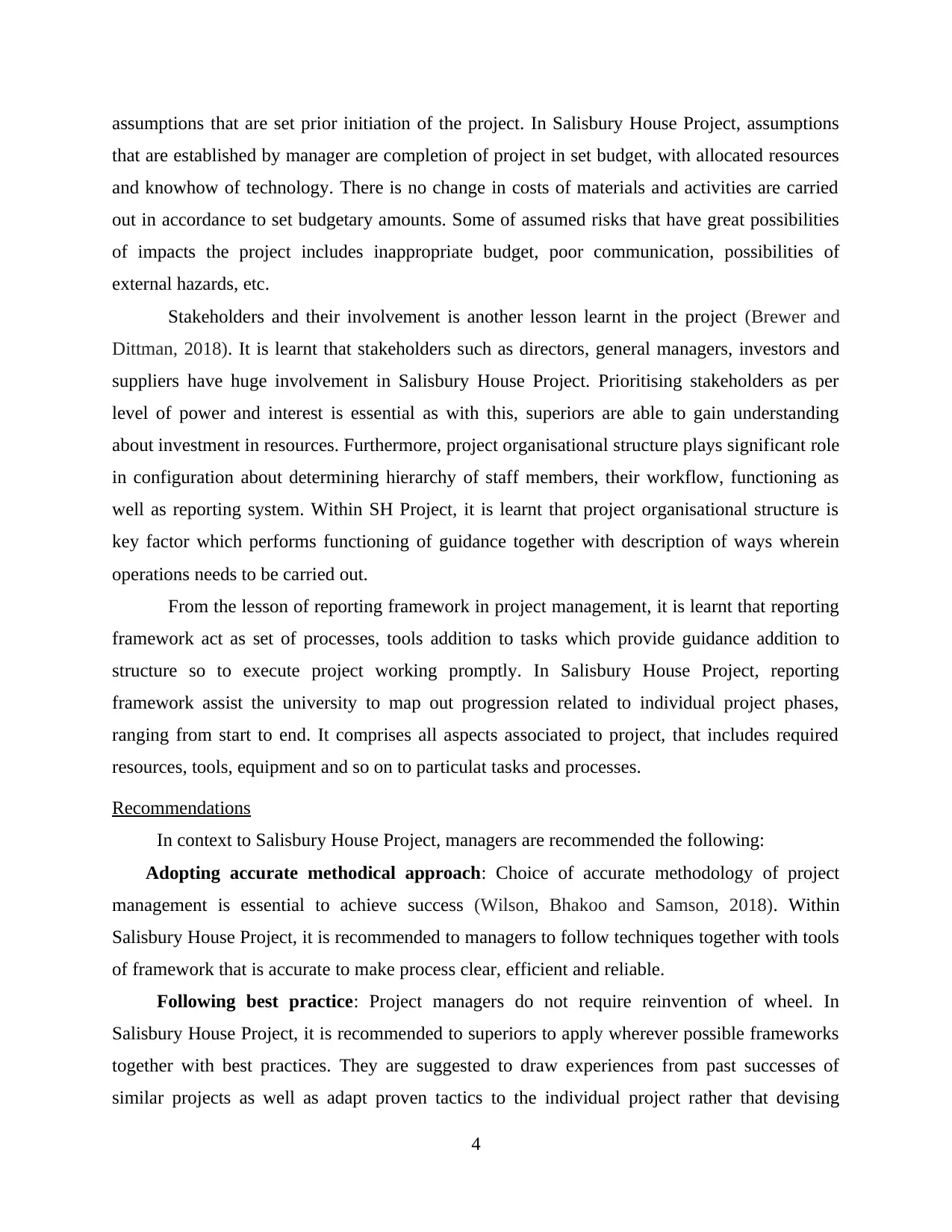
assumptions that are set prior initiation of the project. In Salisbury House Project, assumptions
that are established by manager are completion of project in set budget, with allocated resources
and knowhow of technology. There is no change in costs of materials and activities are carried
out in accordance to set budgetary amounts. Some of assumed risks that have great possibilities
of impacts the project includes inappropriate budget, poor communication, possibilities of
external hazards, etc.
Stakeholders and their involvement is another lesson learnt in the project (Brewer and
Dittman, 2018). It is learnt that stakeholders such as directors, general managers, investors and
suppliers have huge involvement in Salisbury House Project. Prioritising stakeholders as per
level of power and interest is essential as with this, superiors are able to gain understanding
about investment in resources. Furthermore, project organisational structure plays significant role
in configuration about determining hierarchy of staff members, their workflow, functioning as
well as reporting system. Within SH Project, it is learnt that project organisational structure is
key factor which performs functioning of guidance together with description of ways wherein
operations needs to be carried out.
From the lesson of reporting framework in project management, it is learnt that reporting
framework act as set of processes, tools addition to tasks which provide guidance addition to
structure so to execute project working promptly. In Salisbury House Project, reporting
framework assist the university to map out progression related to individual project phases,
ranging from start to end. It comprises all aspects associated to project, that includes required
resources, tools, equipment and so on to particulat tasks and processes.
Recommendations
In context to Salisbury House Project, managers are recommended the following:
Adopting accurate methodical approach: Choice of accurate methodology of project
management is essential to achieve success (Wilson, Bhakoo and Samson, 2018). Within
Salisbury House Project, it is recommended to managers to follow techniques together with tools
of framework that is accurate to make process clear, efficient and reliable.
Following best practice: Project managers do not require reinvention of wheel. In
Salisbury House Project, it is recommended to superiors to apply wherever possible frameworks
together with best practices. They are suggested to draw experiences from past successes of
similar projects as well as adapt proven tactics to the individual project rather that devising
4
that are established by manager are completion of project in set budget, with allocated resources
and knowhow of technology. There is no change in costs of materials and activities are carried
out in accordance to set budgetary amounts. Some of assumed risks that have great possibilities
of impacts the project includes inappropriate budget, poor communication, possibilities of
external hazards, etc.
Stakeholders and their involvement is another lesson learnt in the project (Brewer and
Dittman, 2018). It is learnt that stakeholders such as directors, general managers, investors and
suppliers have huge involvement in Salisbury House Project. Prioritising stakeholders as per
level of power and interest is essential as with this, superiors are able to gain understanding
about investment in resources. Furthermore, project organisational structure plays significant role
in configuration about determining hierarchy of staff members, their workflow, functioning as
well as reporting system. Within SH Project, it is learnt that project organisational structure is
key factor which performs functioning of guidance together with description of ways wherein
operations needs to be carried out.
From the lesson of reporting framework in project management, it is learnt that reporting
framework act as set of processes, tools addition to tasks which provide guidance addition to
structure so to execute project working promptly. In Salisbury House Project, reporting
framework assist the university to map out progression related to individual project phases,
ranging from start to end. It comprises all aspects associated to project, that includes required
resources, tools, equipment and so on to particulat tasks and processes.
Recommendations
In context to Salisbury House Project, managers are recommended the following:
Adopting accurate methodical approach: Choice of accurate methodology of project
management is essential to achieve success (Wilson, Bhakoo and Samson, 2018). Within
Salisbury House Project, it is recommended to managers to follow techniques together with tools
of framework that is accurate to make process clear, efficient and reliable.
Following best practice: Project managers do not require reinvention of wheel. In
Salisbury House Project, it is recommended to superiors to apply wherever possible frameworks
together with best practices. They are suggested to draw experiences from past successes of
similar projects as well as adapt proven tactics to the individual project rather that devising
4
Paraphrase This Document
Need a fresh take? Get an instant paraphrase of this document with our AI Paraphraser
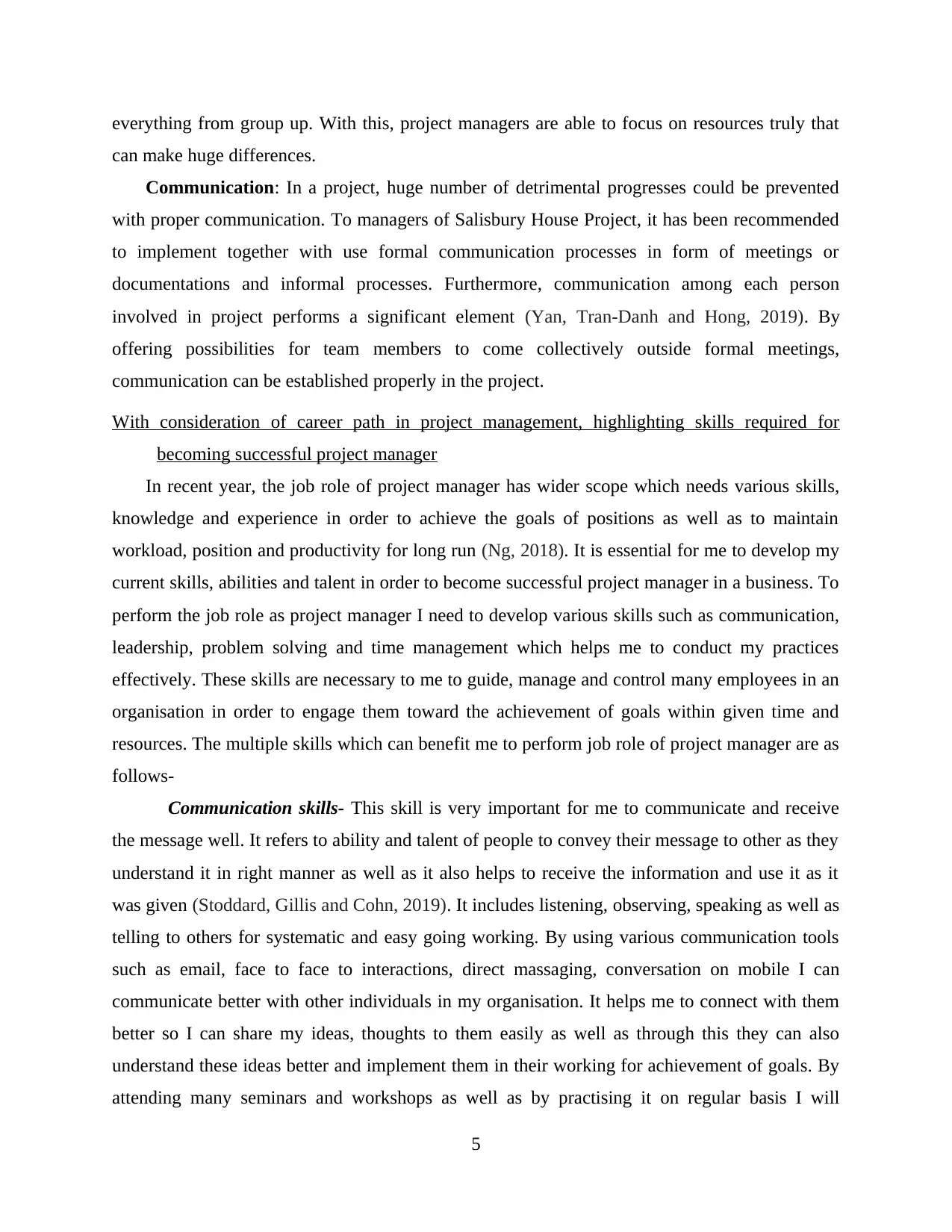
everything from group up. With this, project managers are able to focus on resources truly that
can make huge differences.
Communication: In a project, huge number of detrimental progresses could be prevented
with proper communication. To managers of Salisbury House Project, it has been recommended
to implement together with use formal communication processes in form of meetings or
documentations and informal processes. Furthermore, communication among each person
involved in project performs a significant element (Yan, Tran-Danh and Hong, 2019). By
offering possibilities for team members to come collectively outside formal meetings,
communication can be established properly in the project.
With consideration of career path in project management, highlighting skills required for
becoming successful project manager
In recent year, the job role of project manager has wider scope which needs various skills,
knowledge and experience in order to achieve the goals of positions as well as to maintain
workload, position and productivity for long run (Ng, 2018). It is essential for me to develop my
current skills, abilities and talent in order to become successful project manager in a business. To
perform the job role as project manager I need to develop various skills such as communication,
leadership, problem solving and time management which helps me to conduct my practices
effectively. These skills are necessary to me to guide, manage and control many employees in an
organisation in order to engage them toward the achievement of goals within given time and
resources. The multiple skills which can benefit me to perform job role of project manager are as
follows-
Communication skills- This skill is very important for me to communicate and receive
the message well. It refers to ability and talent of people to convey their message to other as they
understand it in right manner as well as it also helps to receive the information and use it as it
was given (Stoddard, Gillis and Cohn, 2019). It includes listening, observing, speaking as well as
telling to others for systematic and easy going working. By using various communication tools
such as email, face to face to interactions, direct massaging, conversation on mobile I can
communicate better with other individuals in my organisation. It helps me to connect with them
better so I can share my ideas, thoughts to them easily as well as through this they can also
understand these ideas better and implement them in their working for achievement of goals. By
attending many seminars and workshops as well as by practising it on regular basis I will
5
can make huge differences.
Communication: In a project, huge number of detrimental progresses could be prevented
with proper communication. To managers of Salisbury House Project, it has been recommended
to implement together with use formal communication processes in form of meetings or
documentations and informal processes. Furthermore, communication among each person
involved in project performs a significant element (Yan, Tran-Danh and Hong, 2019). By
offering possibilities for team members to come collectively outside formal meetings,
communication can be established properly in the project.
With consideration of career path in project management, highlighting skills required for
becoming successful project manager
In recent year, the job role of project manager has wider scope which needs various skills,
knowledge and experience in order to achieve the goals of positions as well as to maintain
workload, position and productivity for long run (Ng, 2018). It is essential for me to develop my
current skills, abilities and talent in order to become successful project manager in a business. To
perform the job role as project manager I need to develop various skills such as communication,
leadership, problem solving and time management which helps me to conduct my practices
effectively. These skills are necessary to me to guide, manage and control many employees in an
organisation in order to engage them toward the achievement of goals within given time and
resources. The multiple skills which can benefit me to perform job role of project manager are as
follows-
Communication skills- This skill is very important for me to communicate and receive
the message well. It refers to ability and talent of people to convey their message to other as they
understand it in right manner as well as it also helps to receive the information and use it as it
was given (Stoddard, Gillis and Cohn, 2019). It includes listening, observing, speaking as well as
telling to others for systematic and easy going working. By using various communication tools
such as email, face to face to interactions, direct massaging, conversation on mobile I can
communicate better with other individuals in my organisation. It helps me to connect with them
better so I can share my ideas, thoughts to them easily as well as through this they can also
understand these ideas better and implement them in their working for achievement of goals. By
attending many seminars and workshops as well as by practising it on regular basis I will
5
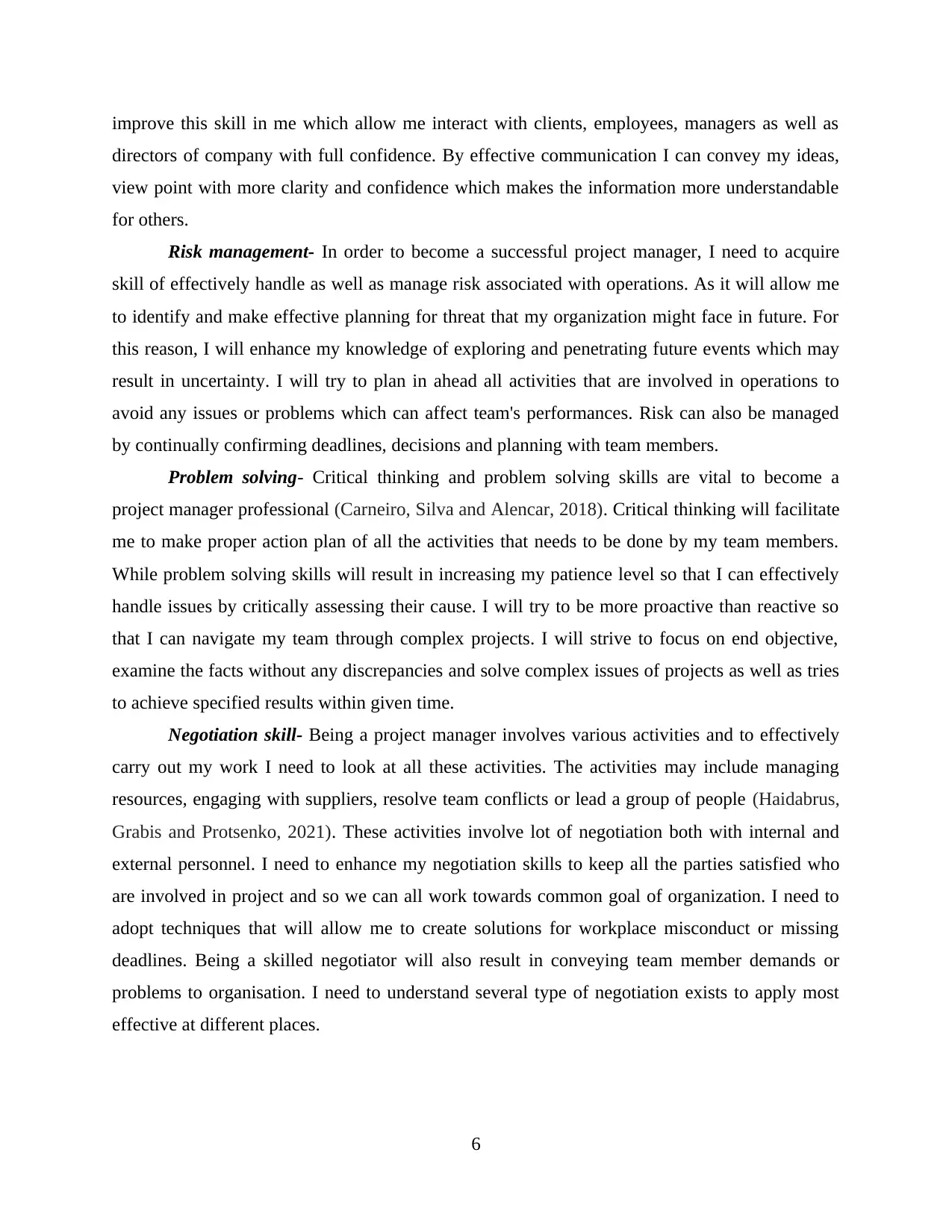
improve this skill in me which allow me interact with clients, employees, managers as well as
directors of company with full confidence. By effective communication I can convey my ideas,
view point with more clarity and confidence which makes the information more understandable
for others.
Risk management- In order to become a successful project manager, I need to acquire
skill of effectively handle as well as manage risk associated with operations. As it will allow me
to identify and make effective planning for threat that my organization might face in future. For
this reason, I will enhance my knowledge of exploring and penetrating future events which may
result in uncertainty. I will try to plan in ahead all activities that are involved in operations to
avoid any issues or problems which can affect team's performances. Risk can also be managed
by continually confirming deadlines, decisions and planning with team members.
Problem solving- Critical thinking and problem solving skills are vital to become a
project manager professional (Carneiro, Silva and Alencar, 2018). Critical thinking will facilitate
me to make proper action plan of all the activities that needs to be done by my team members.
While problem solving skills will result in increasing my patience level so that I can effectively
handle issues by critically assessing their cause. I will try to be more proactive than reactive so
that I can navigate my team through complex projects. I will strive to focus on end objective,
examine the facts without any discrepancies and solve complex issues of projects as well as tries
to achieve specified results within given time.
Negotiation skill- Being a project manager involves various activities and to effectively
carry out my work I need to look at all these activities. The activities may include managing
resources, engaging with suppliers, resolve team conflicts or lead a group of people (Haidabrus,
Grabis and Protsenko, 2021). These activities involve lot of negotiation both with internal and
external personnel. I need to enhance my negotiation skills to keep all the parties satisfied who
are involved in project and so we can all work towards common goal of organization. I need to
adopt techniques that will allow me to create solutions for workplace misconduct or missing
deadlines. Being a skilled negotiator will also result in conveying team member demands or
problems to organisation. I need to understand several type of negotiation exists to apply most
effective at different places.
6
directors of company with full confidence. By effective communication I can convey my ideas,
view point with more clarity and confidence which makes the information more understandable
for others.
Risk management- In order to become a successful project manager, I need to acquire
skill of effectively handle as well as manage risk associated with operations. As it will allow me
to identify and make effective planning for threat that my organization might face in future. For
this reason, I will enhance my knowledge of exploring and penetrating future events which may
result in uncertainty. I will try to plan in ahead all activities that are involved in operations to
avoid any issues or problems which can affect team's performances. Risk can also be managed
by continually confirming deadlines, decisions and planning with team members.
Problem solving- Critical thinking and problem solving skills are vital to become a
project manager professional (Carneiro, Silva and Alencar, 2018). Critical thinking will facilitate
me to make proper action plan of all the activities that needs to be done by my team members.
While problem solving skills will result in increasing my patience level so that I can effectively
handle issues by critically assessing their cause. I will try to be more proactive than reactive so
that I can navigate my team through complex projects. I will strive to focus on end objective,
examine the facts without any discrepancies and solve complex issues of projects as well as tries
to achieve specified results within given time.
Negotiation skill- Being a project manager involves various activities and to effectively
carry out my work I need to look at all these activities. The activities may include managing
resources, engaging with suppliers, resolve team conflicts or lead a group of people (Haidabrus,
Grabis and Protsenko, 2021). These activities involve lot of negotiation both with internal and
external personnel. I need to enhance my negotiation skills to keep all the parties satisfied who
are involved in project and so we can all work towards common goal of organization. I need to
adopt techniques that will allow me to create solutions for workplace misconduct or missing
deadlines. Being a skilled negotiator will also result in conveying team member demands or
problems to organisation. I need to understand several type of negotiation exists to apply most
effective at different places.
6
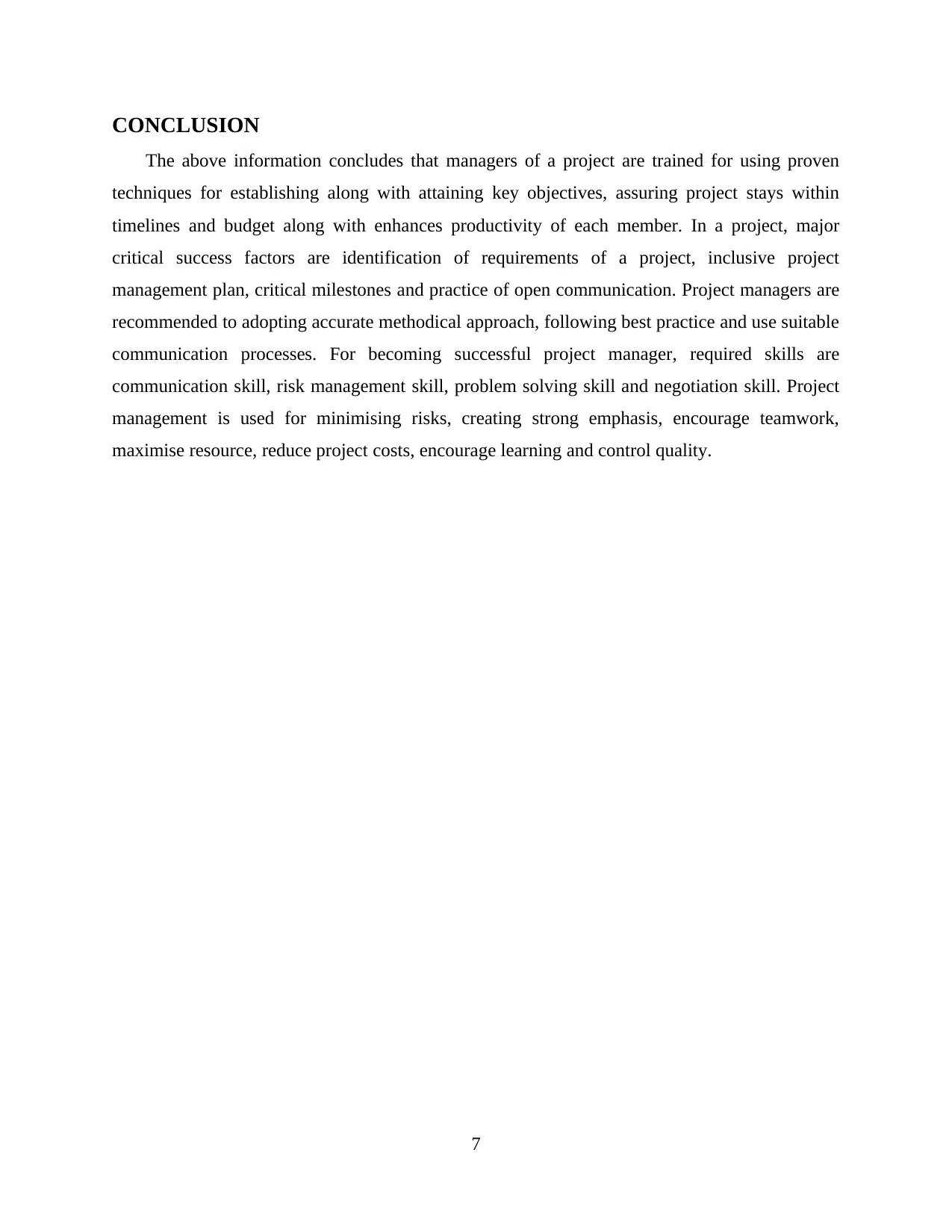
CONCLUSION
The above information concludes that managers of a project are trained for using proven
techniques for establishing along with attaining key objectives, assuring project stays within
timelines and budget along with enhances productivity of each member. In a project, major
critical success factors are identification of requirements of a project, inclusive project
management plan, critical milestones and practice of open communication. Project managers are
recommended to adopting accurate methodical approach, following best practice and use suitable
communication processes. For becoming successful project manager, required skills are
communication skill, risk management skill, problem solving skill and negotiation skill. Project
management is used for minimising risks, creating strong emphasis, encourage teamwork,
maximise resource, reduce project costs, encourage learning and control quality.
7
The above information concludes that managers of a project are trained for using proven
techniques for establishing along with attaining key objectives, assuring project stays within
timelines and budget along with enhances productivity of each member. In a project, major
critical success factors are identification of requirements of a project, inclusive project
management plan, critical milestones and practice of open communication. Project managers are
recommended to adopting accurate methodical approach, following best practice and use suitable
communication processes. For becoming successful project manager, required skills are
communication skill, risk management skill, problem solving skill and negotiation skill. Project
management is used for minimising risks, creating strong emphasis, encourage teamwork,
maximise resource, reduce project costs, encourage learning and control quality.
7
Secure Best Marks with AI Grader
Need help grading? Try our AI Grader for instant feedback on your assignments.
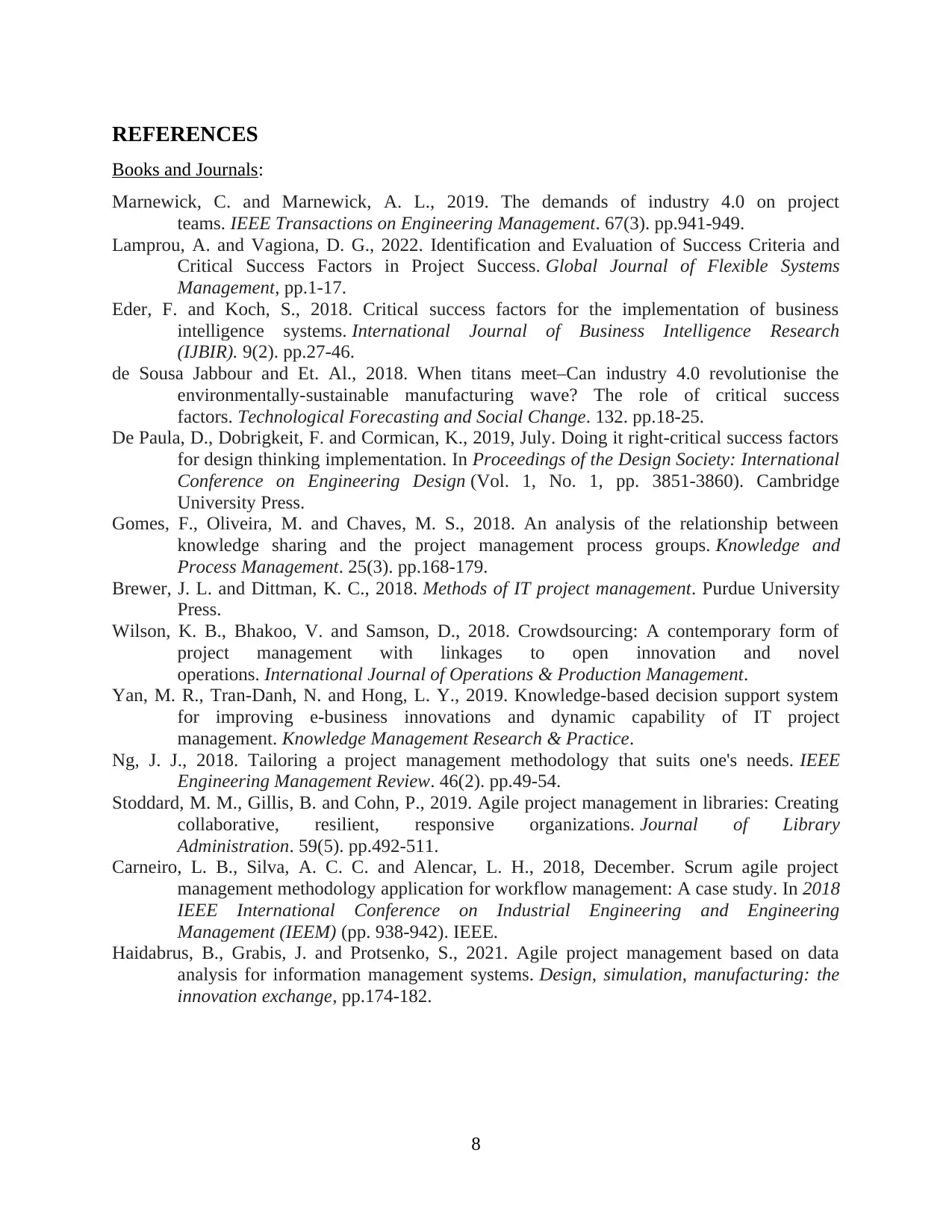
REFERENCES
Books and Journals:
Marnewick, C. and Marnewick, A. L., 2019. The demands of industry 4.0 on project
teams. IEEE Transactions on Engineering Management. 67(3). pp.941-949.
Lamprou, A. and Vagiona, D. G., 2022. Identification and Evaluation of Success Criteria and
Critical Success Factors in Project Success. Global Journal of Flexible Systems
Management, pp.1-17.
Eder, F. and Koch, S., 2018. Critical success factors for the implementation of business
intelligence systems. International Journal of Business Intelligence Research
(IJBIR). 9(2). pp.27-46.
de Sousa Jabbour and Et. Al., 2018. When titans meet–Can industry 4.0 revolutionise the
environmentally-sustainable manufacturing wave? The role of critical success
factors. Technological Forecasting and Social Change. 132. pp.18-25.
De Paula, D., Dobrigkeit, F. and Cormican, K., 2019, July. Doing it right-critical success factors
for design thinking implementation. In Proceedings of the Design Society: International
Conference on Engineering Design (Vol. 1, No. 1, pp. 3851-3860). Cambridge
University Press.
Gomes, F., Oliveira, M. and Chaves, M. S., 2018. An analysis of the relationship between
knowledge sharing and the project management process groups. Knowledge and
Process Management. 25(3). pp.168-179.
Brewer, J. L. and Dittman, K. C., 2018. Methods of IT project management. Purdue University
Press.
Wilson, K. B., Bhakoo, V. and Samson, D., 2018. Crowdsourcing: A contemporary form of
project management with linkages to open innovation and novel
operations. International Journal of Operations & Production Management.
Yan, M. R., Tran-Danh, N. and Hong, L. Y., 2019. Knowledge-based decision support system
for improving e-business innovations and dynamic capability of IT project
management. Knowledge Management Research & Practice.
Ng, J. J., 2018. Tailoring a project management methodology that suits one's needs. IEEE
Engineering Management Review. 46(2). pp.49-54.
Stoddard, M. M., Gillis, B. and Cohn, P., 2019. Agile project management in libraries: Creating
collaborative, resilient, responsive organizations. Journal of Library
Administration. 59(5). pp.492-511.
Carneiro, L. B., Silva, A. C. C. and Alencar, L. H., 2018, December. Scrum agile project
management methodology application for workflow management: A case study. In 2018
IEEE International Conference on Industrial Engineering and Engineering
Management (IEEM) (pp. 938-942). IEEE.
Haidabrus, B., Grabis, J. and Protsenko, S., 2021. Agile project management based on data
analysis for information management systems. Design, simulation, manufacturing: the
innovation exchange, pp.174-182.
8
Books and Journals:
Marnewick, C. and Marnewick, A. L., 2019. The demands of industry 4.0 on project
teams. IEEE Transactions on Engineering Management. 67(3). pp.941-949.
Lamprou, A. and Vagiona, D. G., 2022. Identification and Evaluation of Success Criteria and
Critical Success Factors in Project Success. Global Journal of Flexible Systems
Management, pp.1-17.
Eder, F. and Koch, S., 2018. Critical success factors for the implementation of business
intelligence systems. International Journal of Business Intelligence Research
(IJBIR). 9(2). pp.27-46.
de Sousa Jabbour and Et. Al., 2018. When titans meet–Can industry 4.0 revolutionise the
environmentally-sustainable manufacturing wave? The role of critical success
factors. Technological Forecasting and Social Change. 132. pp.18-25.
De Paula, D., Dobrigkeit, F. and Cormican, K., 2019, July. Doing it right-critical success factors
for design thinking implementation. In Proceedings of the Design Society: International
Conference on Engineering Design (Vol. 1, No. 1, pp. 3851-3860). Cambridge
University Press.
Gomes, F., Oliveira, M. and Chaves, M. S., 2018. An analysis of the relationship between
knowledge sharing and the project management process groups. Knowledge and
Process Management. 25(3). pp.168-179.
Brewer, J. L. and Dittman, K. C., 2018. Methods of IT project management. Purdue University
Press.
Wilson, K. B., Bhakoo, V. and Samson, D., 2018. Crowdsourcing: A contemporary form of
project management with linkages to open innovation and novel
operations. International Journal of Operations & Production Management.
Yan, M. R., Tran-Danh, N. and Hong, L. Y., 2019. Knowledge-based decision support system
for improving e-business innovations and dynamic capability of IT project
management. Knowledge Management Research & Practice.
Ng, J. J., 2018. Tailoring a project management methodology that suits one's needs. IEEE
Engineering Management Review. 46(2). pp.49-54.
Stoddard, M. M., Gillis, B. and Cohn, P., 2019. Agile project management in libraries: Creating
collaborative, resilient, responsive organizations. Journal of Library
Administration. 59(5). pp.492-511.
Carneiro, L. B., Silva, A. C. C. and Alencar, L. H., 2018, December. Scrum agile project
management methodology application for workflow management: A case study. In 2018
IEEE International Conference on Industrial Engineering and Engineering
Management (IEEM) (pp. 938-942). IEEE.
Haidabrus, B., Grabis, J. and Protsenko, S., 2021. Agile project management based on data
analysis for information management systems. Design, simulation, manufacturing: the
innovation exchange, pp.174-182.
8
1 out of 11
Related Documents
Your All-in-One AI-Powered Toolkit for Academic Success.
+13062052269
info@desklib.com
Available 24*7 on WhatsApp / Email
![[object Object]](/_next/static/media/star-bottom.7253800d.svg)
Unlock your academic potential
© 2024 | Zucol Services PVT LTD | All rights reserved.



